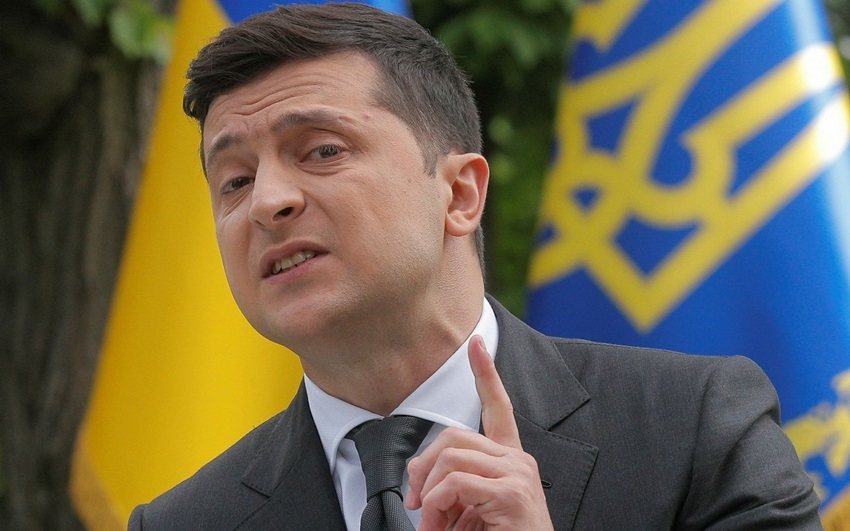Ukraine's hidden storm is slowly moving into reality as the country struggles to grasp from the Euromaidan's dubious foreign policies
When the Ukrainian President, the former film actor Volodymyr Zelenskyi, headed to Turkey for a visit, he appeared to be smiling - he believed gaining support from Ankara was enough for Ukraine to make the process by joining NATO and furthermore, the European Union.
However, this is far from a reality check. Despite NATO has organised exercises with Ukrainian Armed Forces frequently since 2014, Ukraine, somehow, fails to materialise their plans. Its economy has been dumped severely and it is one of the ten most corrupt countries within the European continent, a bit comparable to the rate of Bulgaria, Russia, Belarus and Romania. But while the economy can be fixed, it is the foreign relations of Ukraine that deliver most wary for the other observers.
So why it is necessary to question Ukraine's capability?
It is not easy, but Ukraine's foreign relations post-Euromaidan is deeply entrenched to the West. It has sought to become a member of the European Union and to develop the aspiration to become a NATO state. To do that, she needs to get a partner to help her to drive on the right path.
Unfortunately, something has gone wrong with Ukraine's selection. Instead of looking for some relatively stable and wealthy nations like the Czech Republic, Italy or Denmark, or promising members like Poland and Croatia, Ukraine has utterly selected Turkey to make way into NATO as well as the EU. And this definitely plays a huge price in Ukraine's situation nowadays.
Turkey is a powerful member of NATO, it has been there since the Cold War and maintains as a stable, moderate Muslim country, and the country has a huge prospect of joining the European Union by the end of the 2000s. Yet, relations between Turkey and the West, the model of Ukraine, has begun to get worsen from the 2010s onward, and this has largely been contributed by Ankara's expansionism. Initiated by the Turkish President-turn dictator Recep Tayyip Erdoğan, he sought to revise the education curriculum as well as the government's diplomacies, with the ambition of rebuilding the long-lost Ottoman Empire. Since the war in Syria, Turkey has become belligerent against many countries, including a lot of America's allies.
This includes the conflict over the Kurds, which saw American and NATO forces dropping supplies to aid the Kurds fighting Islamic State's militants, or the recent tensions between Turkey toward Israel and Greece over Palestine and the Mediterranean Sea. The most important, still, belongs to the support Turkey gave Azerbaijan in the recent Karabakh conflict with Armenia in late 2020, which ended with Azerbaijan's victory and claimed a large swathe of the disputed land. Armenia is not a member of NATO or EU, a close ally of Russia, but it is also the country the United States concerns significantly because of World War I's genocide by the Ottomans against the Armenians.
Kyiv's stance has been greatly contradicted by what the West has expected from her when she said she wanted to be a member. Ukraine has supported the Turkish Armed Forces to bomb the Kurds with the belief that the Kurds were trying to get help from Russia. It has also openly sided with Turkey and Azerbaijan against Armenia in late 2020, a move that was seen with shock even by NATO allies like France and the United States. It's especially more shocking that the Ukrainian government was one of the only few governments to firmly condemn Armenia and demanded the Armenians to leave the disputed area with Azerbaijan (though Ukraine also expressed its wish to see both countries return to the status quo). Kyiv has also secretly embraced Turkish expansion on Greek soil, despite Greece also being a NATO member.
While I may understand that it is not the Ukrainian normal populace's fault, given how Ukrainians reacted to the American resolution of recognising the Armenian Genocide in 2019, as well as its criticisms over the government's perceived ineffectiveness, this is not enough and Ukraine is being seen now as taken hostage for Turkey's political gamble. Neither Poroshenko nor Zelenskyi has the wills to correct what Euromaidan should have taken first. Ukraine has failed to receive the change when the United States imposed sanctions on Turkey in 2020, following the purchase of S-400 from Russia and Turkish support for Azerbaijan against Armenia, which is a sign that Ukraine has made itself distrusted by the other NATO states. Meanwhile, Turkey is becoming more authoritarian, thus it looks on Russia as a model to cope and establish an autocratic system - and has engaged in insults and blackmails against other NATO member states like France, Germany, Italy.
Unsurprisingly, the United States Congress has fallen short in designating Ukraine as a major non-NATO ally. And there are protests from the French and German top-brass about admitting Ukraine into the organisation. All thanks for the perceived Ukrainian support for Turkey. If you want to look further after Ukraine announced support for the Turkish plan to clean out the Kurds in northern Syria and Iraq, Israeli, Saudi and Emirati diplomats back in 2017 had lobbied the then-Trump Administration to block Ukraine from joining, with a hidden hint that Ukraine being seen as Turkey's ally.
As Turkey becomes increasingly rouge, it is also having an ailing economy due to the low-interest rates, disastrous economic policies that lead to the fall of the lira to the dollars. Its human rights are slipping with more journalists and politicians imprisoned. Yet Kyiv keeps up its faith in trusting such a rouge regime to be its buddy on their Western-integrating path.
If Ukraine continues to think of Turkey like this, the pain can be very dearly for Kyiv. This is something the country must avoid in order to get back to what Euromaidan used to wish for. But this is slowly turning away regardless.

Comments
Post a Comment